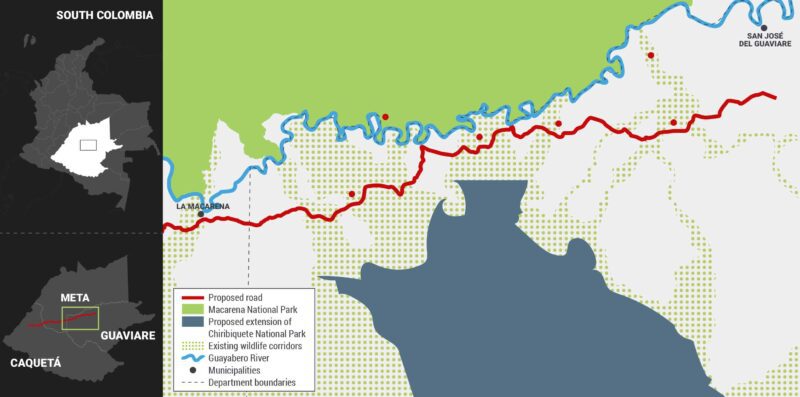By Morgan Hartlein Allen
 In 2017, Colombian journalist Andrés Bermudez Lievano received a grant through the Earth Journalism Network’s Biodiversity Media Initiative to report on the Marginal Jungle Road – a proposed infrastructure project that would bridge the 381 kilometers separating San Vicente del Caguan from San Jose del Guaviare in Central Colombia.
In 2017, Colombian journalist Andrés Bermudez Lievano received a grant through the Earth Journalism Network’s Biodiversity Media Initiative to report on the Marginal Jungle Road – a proposed infrastructure project that would bridge the 381 kilometers separating San Vicente del Caguan from San Jose del Guaviare in Central Colombia.
The road was part of Colombia’s plan to boost regional trade by diagonally connecting Ecuador and Venezuela. But it would have cut through several important ecosystems, including Amazon forests, the Andes mountains, and Orinoquia savannahs.
Biologists told Bermudez it would threaten many species of flora and fauna, since seeds and animals rely on the ability to move between these diverse habitats in order to reproduce and enrich their genetic pools.
If these ecosystems were to become islands in a sea of cattle ranching and oil palm plantations, significant biodiversity would be lost, they said.
As Bermudez began investigating, he realized the project told a bigger story about some of the main challenges facing Colombia: organized crime, lack of sustainable development, and central planning without proper environmental understanding.
The road takes shape
At the time of his reporting, the Marginal Jungle Road had yet to be green-lighted by the Colombian government, but the state had been promoting the project for more than 50 years.
The Revolutionary Armed Forces of Colombia, or FARC, a guerrilla group that took shelter in the jungle during its decades-long battle with the government, had prevented the road from being developed starting in the 1960s.
Yet after the government and FARC signed a peace deal in November 2016, cattle ranchers and developers embarked on a frenzy of forest clearing in anticipation of the road’s construction through previously undisturbed land.
Deforestation is often used to set off legal proceedings in which private entities are granted rights to occupy state-owned land and claim ownership after a period of five years. Expectations of the new road drove many to partake in this land appropriation scheme, Bermudez reported.
Given all the complexities involved with the road’s construction, Bermudez settled on producing a seven-story series highlighting the threats the Marginal Jungle Road posed to this so-called “Noah’s ark” of biodiversity.
During his reporting, he realized that several communities had come up with their own alternatives to the road that would also stimulate trade and economic growth while protecting the natural habitat, for instance through eco-tourism and birdwatching.
He included discussion of these proposed solutions in his series, which ran over a four-month period at the end of 2017 in Semana Sostenible and La Silla Vacia – two prominent media outlets in Latin America – and the US edition of Vice.
Attention grows
Initially, the stories were primarily shared among environmentalists and scientists. Then a group of scientists led by Rodrigo Botero, a biodiversity advocate and former director of the regional office of Colombia’s National Parks for the Amazon, began to draw media attention.
Soon after, a video of Bermudez’s reporting from one of Colombia’s most-watched environmental TV shows circulated on Facebook, further stoking the discussion.
In March 2018, three months after Bermudez’s stories were published, Colombia’s then-President Juan Manuel Santos surprised everyone by emphatically condemning the Marginal Jungle Road in an interview for El Tiempo – Colombia’s largest newspaper. Asked by the reporter whether the project would continue given the controversy surrounding it, the president stated, the road “is not going to be done because from the environmental point of view it would be completely counterproductive.”
Plans for the road were subsequently scrapped, and the project was cancelled.
Bermudez says he would not attribute the decision solely to his reporting, thought he does admit, “I humbly believe it did play a significant role.”
Adriana Vásquez of the Foundation for Conservation and Sustainable Development, an organization studying the road and its greener alternatives, agreed.
“Andrés’s work was important at a key moment after the signing of the Peace Accords in that it foresaw an exponential increase in deforestation in the Amazonian regions formerly controlled by the FARC,” she explained. “The journalistic articles of Andrés were among the first calls to the government, and to the national and international community, to pay attention to the problems of deterioration of the Amazon rainforest.”
Unfortunately, criminal groups have taken an interest in the corridors now that the infrastructure project has been abandoned, making reporting there difficult and potentially dangerous, Bermudez said.
A dogged reporter
Despite those risks, Bermudez has continued to report on issues he uncovered in his original seven stories.
In 2018, for example, he wrote extensively for Pacifista!, a human rights-focused project in Colombia, and Dialogo Chino, an independent journalism platform, on how nature tourism was expanding the economy of Guaviare, an area that would have been impacted by the Marginal Jungle Road.
By capitalizing on Guaviare’s diverse bird populations while supporting their conservation, residents are using bird watching to create job opportunities, he reported.
With new armed actors appearing and regrouping and putting local communities that have traditionally safeguarded the forests at increased risk, Bermudez believes it is crucial that Colombia’s environment be well covered.
“These are not stories about beautiful trees and undiscovered animals we might lose, but about ecosystems that when functioning properly provide all of us with very valuable services,” he explained. “We need to understand what those services are.”
And that requires the help of organizations like Internews’ Earth Journalism Network, he noted.
“Although the Amazon has been gaining prominence in Colombian public opinion and media, funding firsthand reporting there is still very difficult and the region is still vastly under-reported,” Bermudez concluded.
